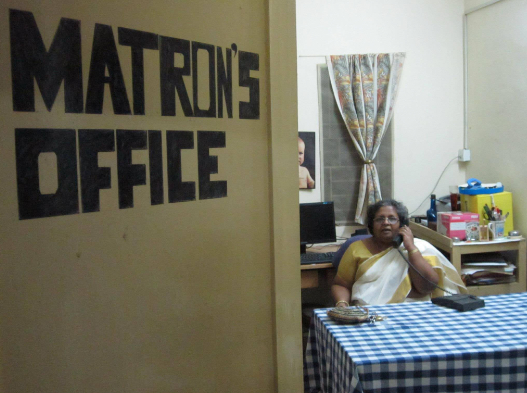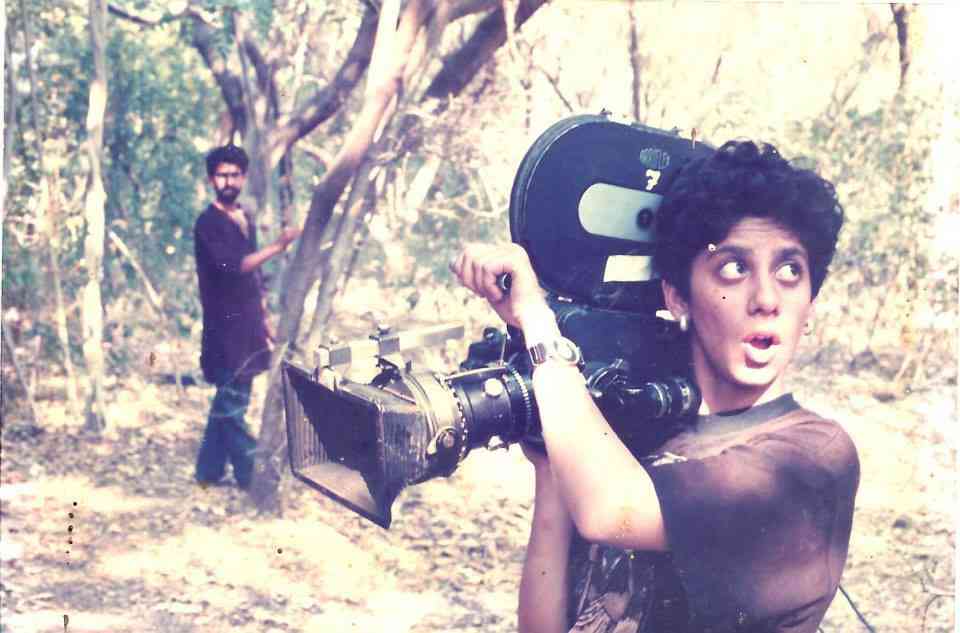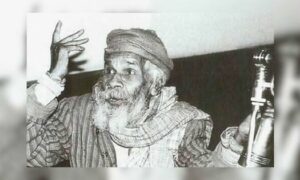An act of demolition served as one of the building blocks of a digital memory project on the Film and Television Institute of India’s female graduates. A separate act of erasure spurred the project, titled A Room Of Our Own and initiated by FTII alum Reena Mohan, Bina Paul and Surabhi Sharma.
A few year ago, the girls’ hostel at the Pune institute was torn down and replaced by another structure. The hostel’s residents swapped old photographs and reminiscences about their time there.
In 2021, the institute commissioned Being FTII, a commemorative volume comprising essays by some of the institute’s best-known alumni – nearly all of them men. The following year, FTII alum Gargi D Chakraborty put together the anthology Balancing The Wisdom Tree. The book comprises information on all the women who had studied at the institute until 2022 as well as essays and interviews with some of the graduates.
She was there too – this basic and yet overlooked truth is one of the ideas driving A Room Of Our Own. How did the women react to living away from home, hostel life and the FTII campus itself? How were their creative journeys shaped by male-dominated classrooms and faculties? These are some of the questions that A Room Of Our Own seeks to answer.
According to the project’s mission statement, “By excavating personal memories, documenting oral histories and re-presenting photographs from private collections that capture our time as students, we foreground a collective gendered experience that seeks to overturn conventional histories of cinema.”
The work-in-progress project includes clips from online interviews with over 50 women, photographs and short videos made by some of the alumni. The subjects include Payal Kapadia, Jabeen Merchant, Batul Mukhtiar, Putul Mahmood and Hemanti Sarkar. The founders will be recording more interviews.
The project’s title is a reference to the writer Virginia Woolf’s famous observation, “A woman must have money and a room of her own if she is to write fiction.” The objective isn’t nostalgia, said Bina Paul, editor, filmmaker and festival programmer from the 1983 batch. Out of the 6,000-odd graduates from FTII since its inception in 1960, approximately 600 are women.
A Room Of Our Own explores “the history that belongs to that physical space, which transcended the space and became a space for all of us in terms of discovery and growth”, Paul pointed out. “There were these great institutions set up in the 1960s,” she added. “But there has been no examination of how these institutions have contributed to the women graduates. We were keen to see how women are placed in not only in Indian cinema history but also in institutional history.”
The project is funded by New York University’s Abu Dhabi campus after an initial grant from the Jai Chandiram Memorial Fellowship at IAWRT India. “Many of us had a room that was not monitored by anybody for the first time in our lives,” observed Sharma, who is Program Head, Film and New Media and Associate Professor of Practice of Film and New Media at NYU Abu Dhabi. “What did the space mean in our trajectory of learning filmmaking, becoming artists and imagining the industry?”
In her film for the archival project, editor and filmmaker Batul Mukhtiar says, “When someone says what community do you belong to, can I say FTII? But when all the markers of the landscapes we once knew change, how do we still feel belonging?”
Parvati Menon, the earliest female student to be enrolled in 1963, calls herself “the first of my species”. In the short film Menon contributed to the project, she talks about pursuing her training exercises while dressed in a sari. Menon also interviews Lakshmi Murari, the wife of FTII’s principal Jagat Murari, who speaks of the wonderment caused by Menon’s presence.
Among the subjects is the hostel’s long-serving matron Gloria Koshy, who is described as a “part friend, part warden, part mother figure”. Koshy was initially “shocked and upset” by the female students, but was then reminded by her husband that “you are not teaching Sunday school”.

Surabhi Sharma says about Koshy, who was the matron from 1982 to 2012, “Gloria treated us as adults with agency. There was this tacit understanding that you are adults, I am available whenever you need me but I am not here for surveillance or scrutiny. So in a sense that conceptual idea of a room of our own where we have complete control was really the critical starting point for this exploration.”
Although committed to encouraging female enrolment, FTII hasn’t always been hospitable to women, the founders told Scroll. As various ex-students began talking to Mohan, Paul and Sharma, repressed memories of sexist behaviour and unfair treatment emerged.
Editor and filmmaker Reena Mohan, who graduated in 1982, was one of two female students in her batch. “There were a total of seven girls in the hostel and around hundred boys on the campus,” Mohan recalled. “Initially, it was fun. It was about being on my own. It was about exploring a new medium.”
The film school’s women-unfriendly culture soon caught up with Mohan, she says. “The faculty and my classmates and the boys in general may not have been actively hostile, but it was ultimately a boys club,” she observed. “You were constantly having to prove yourself or fight for space to say what you wanted to say.”
Sexism could present itself at the entry level itself. Bina Paul gives the example of the filmmaker and educationist Chandita Mukherjee, who died in 2023.
“In her interview, Chandita talks about the fact that when she applied to the institute, she was discouraged by the panel interviewing her,” Paul said. “This is the case even until a few years ago. Women are told, why do you want to study cinematography, let the boys study it. You will anyway get married and go away. This kind of misogyny is often not acknowledged at all.”
To compound matters, students in previous years were rarely presented with female role models, Paul added.
“The whole parallel cinema movement was about men making films about women,” Paul said. “There were no women teachers, very little female presence. So the conversations we tried to have were about how the women tried to find their voices, what was their relationship to cinema and technology, what were the collaborations that the institute afforded.”
By the time Surabhi Sharma enrolled in 1996, the situation had improved – on the surface.
“My cohort was quite unique because ours was the first batch and perhaps the last batch to have so many women, especially in direction,” Sharma said. Seven out of the 10 Indian students were women. There were women in the sound, cinematography and editing departments too.

“It was extraordinary – so much so that two senior male students actually got drunk one night and stood outside the girls’ hostel wailing that Indian cinema was dead,” Sharma recalled. “The chaos that our presence was creating pumped all of us with a lot of confidence and bravado.”
Among the biggest realisations for Sharma was how women blindly absorb the notion that filmmaking is free of gender considerations.
“What was interesting to me then and became even more apparent through this project was the ways in which one refused to identify oneself in terms of gender,” Sharma said. “While the idea was not to be one of the boys, as a filmmaker one wanted to be genderless, without taking into account that one’s experience of the world itself is gendered.”
The FTII faculty and administration were “not interested in this search or quest”, Sharma added. “But between us women, we were having these conversations and making the connections.”
The proposal for A Room of Our Own was initiated in 2019. The initial idea was to conduct in-person conversations. When the coronavirus pandemic hit in 2020, the interviews moved online.
“The pandemic opened up another opportunity – by 2022, we completed almost 55 interviews, sometimes with individuals, sometimes with groups, and almost entirely with the three of us together,” Sharma said.
While the interviewers followed a list of specific questions, they also kept the conversations free-flowing. “The less structured the process was, the freer it became,” Reena Mohan said. “Some of the women were acknowledging or voicing their thoughts even to themselves for the first time.”
The conversations reveal commonalities but divergences too. There are testimonials about casual sexism as well as a sense of liberation, Sharma said.
“The idea is to bring out a collective experience that is not necessarily following one thread, but allows for conflicting threads to come together,” she added. “An experience in 1972 might be reflected in the experience of somebody in 2015. Or two people in 1998 have the exact opposite experience at the same time.”
The women who weather FTII often find that the world beyond the institute’s gates is equally unwelcoming. In this sense, A Room Of Our Own isn’t just about the campus experience, but also about how film industries treat female professionals.
“For the women, another battle begins to prove yourself,” Paul said. “Being from FTII is hardly a qualification.”
The FTII prototype was male by design, Sharma pointed out. “When it was established, FTII was an incredible institution for such a young country to want to imagine, but you also realise that its imagination was centred on a male student,” she said. “It was a progressive idea to train women, but the bottom line of the people within the institution was that women are outsiders. The institution itself was telling you that it was going to be tough for you out there.”
Exclusion is more commonplace than rare, Paul added. “It appears only when women start talking to each together and reflect on what they have gone through,” she said. “There’s a lot of memory that you push away. You never realise how much you normalise it for yourself. That is why it is important that these histories are recorded.”
The founders have made presentations based on the existing material at a few places, such as Harkat in Mumbai and the Asian Women’s Film Festival in Delhi. Upcoming events include the Seoul International Women’s Film Festival and the International Documentary & Short Film Festival of Kerala in Thiruvananthapuram.
“The project is an incredible resource for anyone working on Indian film history, women artists, institutional histories, a feminist understanding of women’s experiences in institutions,” Sharma said. “The project might also interest young students interested in filmmaking, women interested in women in filmmaking, anyone doing an analysis of the way film histories are written.”
Also read:
‘Dreamers and rebels’: The women who reshaped the Film and Television Institute of India
This article first appeared on Scroll.in
📰 Crime Today News is proudly sponsored by DRYFRUIT & CO – A Brand by eFabby Global LLC
Design & Developed by Yes Mom Hosting






